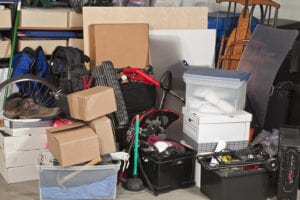What to Do When Seniors with Dementia Hoard Things
 Claire’s mother, Louise, had been diagnosed with dementia a few years ago. One day, while cleaning Louise’s house, Claire discovered a drawer filled with old food and other items from around the house that seemed to have no meaning or particular value. Claire was astonished by the discovery and wondered what was going on. She contacted Louise’s doctor who told her that Louise’s odd collection was a symptom of her dementia called hoarding.
Claire’s mother, Louise, had been diagnosed with dementia a few years ago. One day, while cleaning Louise’s house, Claire discovered a drawer filled with old food and other items from around the house that seemed to have no meaning or particular value. Claire was astonished by the discovery and wondered what was going on. She contacted Louise’s doctor who told her that Louise’s odd collection was a symptom of her dementia called hoarding.
Perhaps your older family member with dementia collects items, too. If so, the behavior can be a challenge to overcome. However, there are ways you can manage the behavior and respond in a manner that doesn’t make it worse. Understanding the behavior and knowing some tips can make dealing with it easier.
What Causes Hoarding?
Hoarding in people with dementia usually happens when they are in the early or middle stages of the disease. Many seniors with dementia who hoard things hide them. Then, they forget where they put the item and may accuse others of stealing it. There are lots of things that can cause your aging relative to hoard things, such as:
- Keeping items makes them feel secure.
- It helps them to cope with losing memories and gives them a sense of control.
- They worry they won’t have enough food later.
- Boredom.
- People who are lifelong collectors may get worse due to dementia.
If you can understand why the older adult is hoarding, it can make the behavior more manageable. Even if you cannot manage it, when you have an understanding, you may be able to more easily accept the behavior and live with it.
Some of the items that people with dementia typically hoard are:
- Food.
- Garbage.
- Old clothing.
- Plastic bags.
- Papers.
Tips for Managing Hoarding
In some cases, hoarding is minor and may not need any intervention. However, if the behavior poses a danger to the older adult, such as creating a great deal of clutter around the house that is a fire hazard or could cause the senior to trip, you may need to do something about it. Some tips for dealing with mild hoarding for people with dementia are:
- Assign a box or drawer where the senior can keep things they want to keep safe.
- Learn the older adult’s hiding places and check them regularly for things that need to be removed, like old food.
- Avoid leaving things lying around the senior might take, like important documents or keys.
- Keep duplicate items of things the older adult might take, including keys or glasses.
Home care can also help to manage hoarding in older adults. If the behavior is caused by a feeling of insecurity, knowing there is a home care provider around to keep them safe can help the older adult to feel better and prevent the behavior. Home care providers can also help to keep items put away that the senior might take and check their hiding places to clean out unwanted items.
Sources
https://www.webmd.com/alzheimers/alzheimers-hoarding-hiding
https://www.verywellhealth.com/hoarding-and-dementia-97611
https://www.alzheimers.org.uk/about-dementia/symptoms-and-diagnosis/symptoms/hiding-hoarding-losing
If you or an aging loved one is considering home care in Robbinsville, NJ, please contact the caring staff at Care Street Home Care today. Call (732) 607-8870.
- Signs Your Senior Parent Needs Home Care Assistance - January 17, 2025
- Hearing Rehabilitation: Empowering Seniors for Better Living - January 10, 2025
- Understanding How Cartilage Changes Over the Years - January 3, 2025
